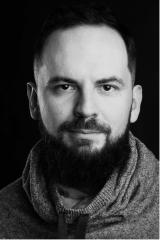Five Poems - Aleksey Porvin
Bread and Salt
People do not welcome the marching ranks
with bread and salt—only a manure pile
sprinkled with white snow recreates the image
of hospitality that has lived for centuries.
Birds circle above the border, then
stretch into a line, lifting the frontier
into the winter air, not expecting the shot
that will scatter them to the corners of longing.
The fibers of love and despair entwined
into a strong thread that stitched together
a family album that darkens under the falling snow
cooling its charred edges.
The only way to go out and meet them with bread
is remembering how the soft inside breaks,
how its pores were gathered together into a single whole
by heat alone, heat not subject to words.
The beating comes out of the chest, expanding,
becoming this air that bares itself to their beaks,
breathing with hidden heat
like a fresh loaf served to guests.
The birds carry off your heart
in pieces pronounced in different languages,
but it matters how they were once held together,
what threads once sewed them up.
The Road
Our victory, in its colorless attire,
without distinguishing features or identifiable language,
is a process of transition from one into another.
It concerns the most important words.
But first it touches each heart, to see
how its beat becomes an alternation between flowers
and gunfire–does time move in that rhythm,
washing colors and shades from the landscape?
A woman and child among those trudging along—
his cries buttoned up with bruises, but the blue sky
and the white milk of far red villages
are blended with his voice.
The word "independence" becomes a thing
people can trip over as they escape the front.
The road wallows in fragments of trees,
tattered paper, shattered glass.
All these objects are smeared with soot
from the blast that dressed everyone in night.
Their former clothes are hung on a flagpole to dry in
the combination of colors that once signified a flag.
Animals Understand
Many things are easier to acquire in childhood:
a foreign—no, neighboring—language,
impressions of day, thoughts of history
in a country divided in two.
There are scratches on the tree trunks
left by bullets: we won't read these
lines, we won't put them into letters: on the horizon
allied banners loom mute.
Animals understand: gotta keep biting to the end,
not hand over territory, not let your body be torn apart
—that’s why words love them,
why they adopt this method of living.
In times gone by, the chronicles
of collective days were kept on birch scrolls.
Yesterday, hungry children passing
through these woods chewed young bark.
What will the unrealized birchbark see?
What signs will it accept? The marks of juvenile teeth,
like those left on the hands of the marauders
who went through the woods to the orphanage.
What will the might-have-been birchbark see?
The darkness in the stomachs of children
who digested the thunder of guns and the shouts of soldiers.
The silence isn’t hard to explain.
Leaving the Church
People were waiting for some bread, but the only grain
to grind is news washed with blood.
No matter what you do, everything tastes like salt,
even the water finding its way out.
Water won't get lost in the cracks in the world
that we call trenches, won't get stuck
at the exit from the enumeration of incomprehensible words,
all troops have retreated from… and …estimated casualties.
The man stepping out of the church will see
the flags at half-mast—that means the sky
hooked itself on them as it descended, dragged them down,
wishing, perhaps, to press them into the earth.
Water follows the sky towards the ground.
After the late light, only the sound
of a request doesn't follow the general order,
looks down at passports charred in the blast.
The man sees how his words of prayer
passed through an abundance of holes in the ceiling
like flour through a sieve so the stones can be shed.
Seeing it turns him to stone.
What can he compare his citizenship to?
To this church dome raked with machine-gun fire.
There are so many cracks in it, his gaze gets lost,
wandering them like a labyrinth inside a stone.
The Philosophy of Geography
The place we live will never be an object.
It will be process of cognition—or, as a last resort,
a thinking subject churning the seasons of the year,
digesting words and actions.
The flame that has passed through cities and villages choruses;
it’s a whole hooting class, looking at the grownups
as if they’d throw the ashes of every constitution on their faces
just to cover the adult pallor that reminds them of winter.
The teacher won't ask them about their homeland’s borders—
the boy from Bryansk in a shirt striped like a checkpoint’s gate bar,
the girl from Donetsk with braids that hang in dotted lines
like the ones grownups use to mark disputed boundaries.
Full-blooded children's talk, ruddy with feelings,
stepping on the clarity of thought like troops
on enemy territory–those are the marks of the subject
to which every soldier swears his oath.
Outside the window is spring, and all the objects on the street
are trying to bring themselves back to life, forgetting
they’ve already poured out all their tenacity for the people—but the teacher
is only wondering what to teach children with a burnt map.
Remove the barrier of absence, erase the tank tracks
in other people’s soil with the tension of meaning (the approved meaning
—what else is there?) and you can let love for a country
that was never an object run through the riverbeds within you.
